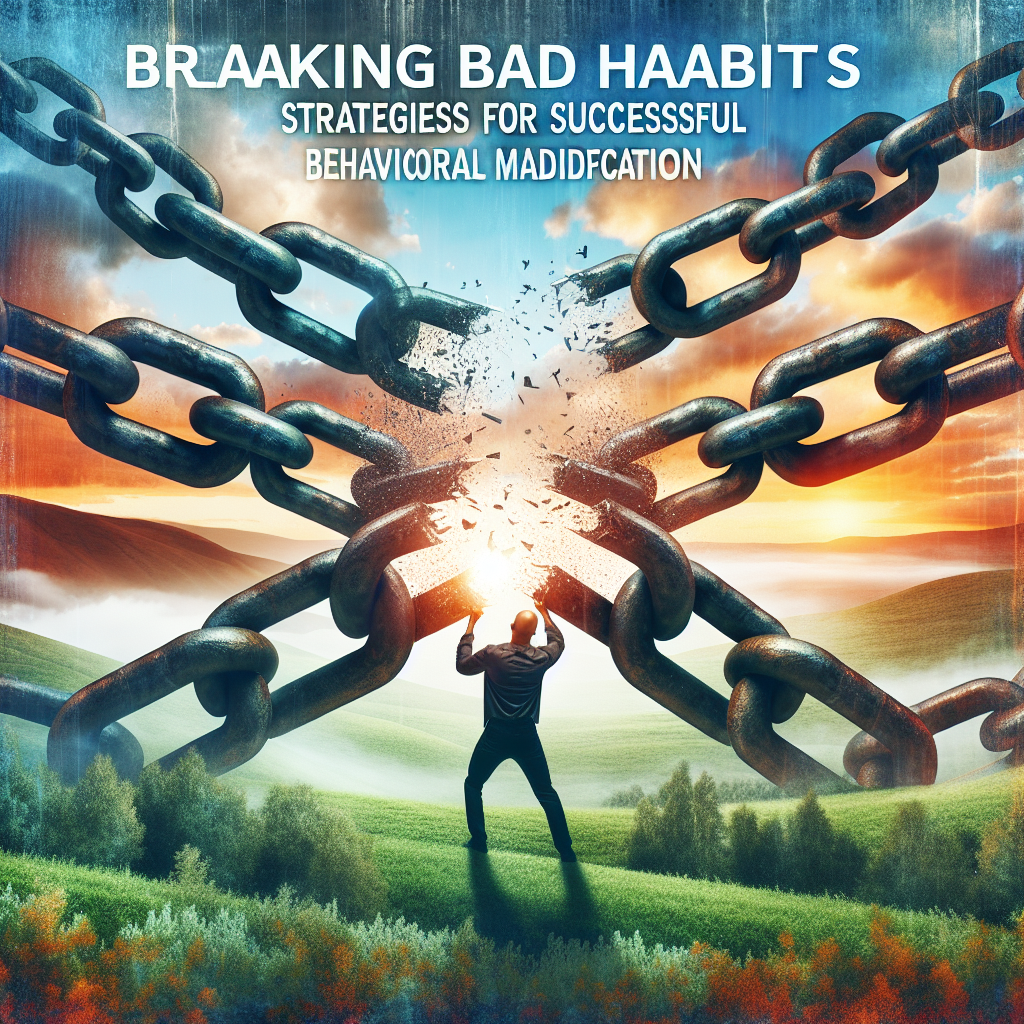Breaking Bad Habits: Strategies for Successful Behavioral Modification
Introduction
Habits are powerful forces in our lives, shaping our behaviors and influencing our everyday choices. While some habits, such as brushing your teeth or exercising regularly, are beneficial to our health and well-being, others can be detrimental, leading to negative consequences in our lives. Breaking bad habits and adopting healthier behaviors can be a challenging process, but with the right strategies and mindset, it is possible to make positive changes and create a more fulfilling life.
Identifying Bad Habits
The first step in breaking bad habits is to identify them. This can be a difficult task, as habits are often deeply ingrained in our daily routines and may be automatic or unconscious. To identify your bad habits, take some time to reflect on your behaviors and patterns. Make a list of habits that you feel are harmful or holding you back from reaching your goals. Common bad habits include procrastination, overeating, smoking, excessive screen time, and negative self-talk.
Understanding the Root Cause
Once you have identified your bad habits, it is important to understand the underlying reasons why they exist. Habits often serve a purpose, whether it is to cope with stress, boredom, or negative emotions. By understanding the root cause of your habits, you can begin to address the underlying issues and develop healthier coping mechanisms.
Setting Realistic Goals
Breaking bad habits takes time and effort, so it is important to set realistic goals for yourself. Start by focusing on one habit at a time, rather than trying to change everything at once. Set specific, measurable goals for overcoming your bad habits and track your progress along the way. Celebrate small victories and be kind to yourself as you work towards creating positive change in your life.
Replacing Bad Habits with Healthy Behaviors
Once you have identified your bad habits and set realistic goals for change, it is time to replace these habits with healthier behaviors. Instead of simply trying to eliminate a bad habit, focus on what you can do instead. For example, if you are trying to break the habit of mindless snacking, replace it with a healthier alternative such as grabbing a piece of fruit or going for a walk. By replacing bad habits with positive behaviors, you can create lasting change and improve your overall well-being.
Staying Accountable
Breaking bad habits can be challenging, so it is important to stay accountable and seek support from others. Share your goals with friends or family members who can provide encouragement and help keep you on track. Consider joining a support group or working with a therapist to overcome your bad habits and develop healthier coping strategies. By staying accountable and surrounding yourself with a positive support system, you can increase your chances of success in breaking bad habits.
FAQs
Q: How long does it take to break a bad habit?
A: The time it takes to break a bad habit can vary depending on the individual and the habit itself. Some experts suggest that it takes an average of 21 days to form a new habit, but this timeline can vary widely. Breaking a bad habit may take weeks, months, or even longer, depending on the complexity of the habit and the individual’s commitment to making positive changes.
Q: What are some common barriers to breaking bad habits?
A: There are many common barriers that can make it difficult to break bad habits, including lack of motivation, fear of change, stress, and negative self-talk. It is important to identify these barriers and develop strategies for overcoming them. For example, if stress is a barrier to breaking a bad habit, consider incorporating stress-reduction techniques such as mindfulness meditation or exercise into your daily routine.
Q: How can I stay motivated when trying to break a bad habit?
A: Staying motivated when trying to break a bad habit can be challenging, but there are several strategies that can help. Set clear goals for yourself and track your progress along the way. Celebrate small victories and reward yourself for making positive changes. Surround yourself with a positive support system of friends, family, or a support group who can provide encouragement and accountability. Remember that breaking bad habits takes time and effort, so be patient with yourself and stay focused on your long-term goals.
Conclusion
Breaking bad habits and adopting healthier behaviors is a challenging but rewarding process. By identifying your bad habits, understanding the root cause, setting realistic goals, replacing bad habits with healthy behaviors, and staying accountable, you can create positive change in your life and improve your overall well-being. Remember that breaking bad habits takes time and effort, so be patient with yourself and stay committed to making positive changes. With the right strategies and mindset, you can overcome your bad habits and create a more fulfilling and satisfying life.




Leave A Comment